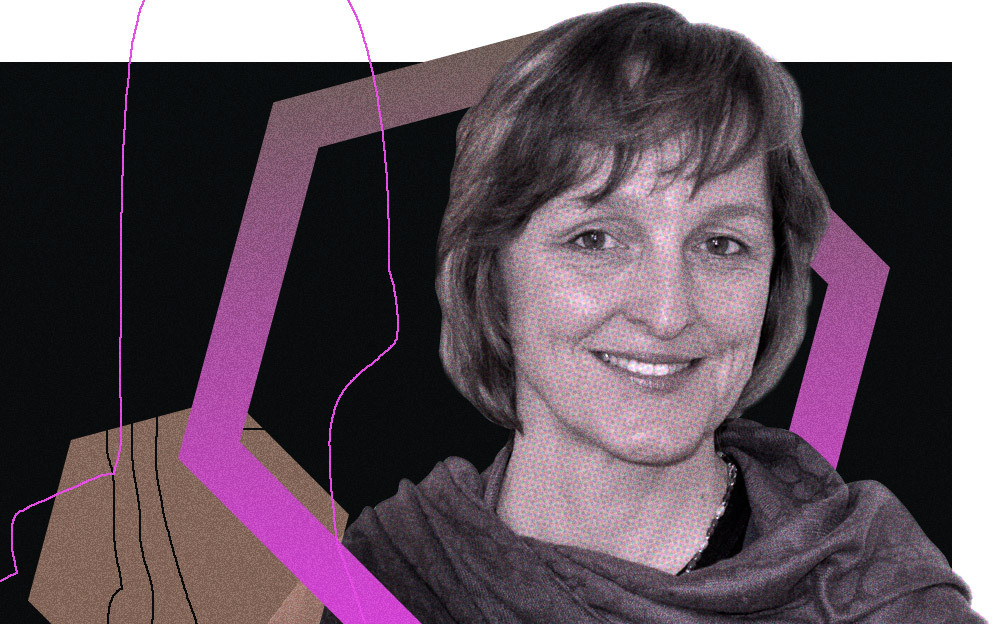Silke Helfrich is a writer author and commons defender. She was the Director of the Heinrich Böll Foundation from 1996 to 1998. She travels throughout Europe meeting with leading theorists of the commons and frontline activists. She is co-founder of the Commons-Institut in Germany, the Commons Strategies Group in 2010, with Michel Bauwens of the Foundation for Peer to Peer Alternatives and David Bollier.
As one of our advisors, we talked with her about blockchian technology, gender and of course, commons.
For the readers who are not familiar with the commons: How would you define them?
Not in one word, nor in one sentence. A commons is not a thing or a resource. Using a noun simply doesn’t do the job! A verb is better: commoning. It means doing things differently than we are used to in market-state societies. This is a good starting point for diving into the topic.
In your last book, Free, Fair and Alive, you talk about the Triad of Commoning. Could you explain this concept to us?
What David Bollier and I call the Triad of Commoning is a possibility to explain what commoning is all about and how it’s being enacted. You obviously can’t define a certain way of doing in mathematical terms. But you can coherently describe the different dimensions commoning is made of. This is what we tried to do. The result, the Triad of Commoning, gives language and guidance for enacting the commons. It’s called a “triad” because we group our descriptions of patterns of commoning into three distinct but interrelated realms of life.
First and foremost, there is the way people relate to each other, the social life of commoning. There you find certain dynamics or relational logics that can be described, communicated and enacted! Second, there are patterns which describe how groups, networks and even societies govern themselves, how they enact self-governance. Thirdly, there are commons-friendly ways to produce and distribute the things we use and need to survive. So, commoning consists of: the social life, peer governance, and provisioning through commons. This approach changes a lot, just as commoning changes a lot. It actually changes everything: The way you set up and govern institutions, the way you look at the economy and you’re doing economy, the socio-cultural part and obviously ourselves.
By the way, calling it Triad of Commoning doesn’t mean that there aren’t other realms we should have a closer look at when conceptualizing commoning. It’s just that these are three primary ones. But there is also the legal dimension. If the law was more commons-friendly, we would certainly be able to come up with other types of norms, rules and laws than we have right now. So perhaps this triad will evolve into a framework with more dimensions.

“
Commoning changes everything: The way you set up and govern institutions, the way you look at the economy and you’re doing economy, the socio-cultural part and obviously ourselves
When we talk about peer governance, the third of Ostrom’s principles comes to my mind, that is, ensuring that everyone affected by rules in a commons can participate in modifying them. It addresses the importance of participation but also power dynamics within the commons. Is there any way to mitigate power dynamics that appear to be reproduced in groups?
It is important to understand that the commons is not only about group or group behaviours. In my understanding, the ideas of the commons and commoning apply at any level, because they simply express an ethical dynamic and rationality with which we relate to each other, relate to nature, do the things we are doing and produce the things we are producing. It is not only about groups.
But you are right. There are power dynamics and conflicts going on in the commons, as it happens in any group or network. After all, we are talking about complex social systems and we are talking about us – complex human beings. What we call patterns of commoning, is basically a tool to deal with these issues. The patterns we have coined draw upon a methodology and theory developed by Christopher Alexander. They don’t just describe commoning; they are meant to be applied in practice. If you apply them, you will be better equipped to naturally deal with power dynamics. The patterns are like a compass, they show the direction and enable you to find ways that power dynamics and conflicts can be successfully dealt with, or not arise in the first place.
Changing the topic a little, what do you think about the role of technology in managing the commons?
First of all, technology poses challenges in whatever realm it is used, whether within a commons or not. The basic issues is what we make out of it, how we use it, and for what purpose. Also, there is no such thing as “the” technology; there are multiple types of technologies that come with different affordances. Some are more helpful to support life than others; some are simply designed to maximize profit.
Technologies can be an important part of a commons if they help us distribute tasks, if they help us connect and federate different commons more easily, and if they help us set up infrastructures we need for cooperation at scale. However, we stress that we should focus on what we call convivial tools. This idea is at the heart of how any technology should be used and designed. Look at agricultural machinery: We reached a stage where the land and the fields are adapted to the machines rather than the other way round. This is why convivial tools are important: they are con–vivial – they go with life, not against it. They are not closed and proprietary, but open and inviting to new uses and modifications for our own needs. Convivial tools enhance our capacity as human beings to make the final decisions that affect us. So we should use those technologies that by design allow us to control the technology, instead of having the technology control us.
“
We should focus on what we call convivial tools, – they go with life, not against it. They are not closed and proprietary, but open and inviting to new uses and modifications for our own needs.
Are you familiar with blockchain?
I am a little, yeah.
David Rozas is the social researcher of our project, and we wrote, with other people, the paper, “When Ostrom Meets Blockchain: Exploring the Potentials of Blockchain for Commons Governance.” In that paper, he argues that blockchain technology “could facilitate the deployment of alternative networks able to operate as commons, and to reuse and adapt the encoded rules of the community while still using the shared infrastructure”. He argues that “this could have an impact shaping the dynamics of power between those who, in centralised infrastructure, control the infrastructure, and those who don’t”. Do you agree with this?
Part of the answer involves whether the technology is “appropriable”. There is a famous book by Matthew B. Crawford, Shop Class for Soulcraft, which explains this idea of “appropriation” in a slightly different way. It basically says, “You only own it if you can repair it,” and “I am, if I control the process of making”. As far as I understand it, many blockchain-applications are turning this idea upside down: they make interactions uncontrollable for human beings and enact a kind of institutionalised trustlessness. People leave to the technology the most important thing that we, as human beings are supposed to enact: trust. This is the opposite of a convivial tool that doesn’t take the decisions for us.
Blockchain applications usually leave us, human beings, out of the equation. That’s not really a commons-friendly way to set up distributed infrastructures. In the long run, we will get used to letting the technology usurp choices that we as human beings ought to be making. I would prefer agent-centric models for blockchain applications. Holochain is a set of networking protcols that does this. It’s not efficient – nor ecologically sustainable – to use a blockchain for every tiny decision, such as sending 5 Euros from here to there, we wouldn’t need as human beings to entrust any transaction to a technology. And if it is true that commoning is first and foremost a way of live, a cultural way of being and acting, then we should not rely on technologies that take away from us the most important responsibility we have, that is enacting and enhancing trust again and again and again. If we fail, well… we need to try again and fail better.

What about the role of women? They have always been the protectors of the commons, in a sense that they take care of the livelihoods, take care of the provisions, take care of the caring for the community, usually in very invisible ways. Silvia Federici has shown how women are frequently the protectors and users of commons, and the first to be harmed by enclosures. Do you agree with this and could you talk a little bit about the role of the women in managing the commons?
I agree of course, women are usually the caretakers and those who rely on so called informal knowledge, as opposed to scientific knowledge. They also cultivate the emotional relationships, do the “affective labor” as some (female) anthropologists call it.
In modern industrial societies, there is an implicit divide between the abstract, decontextualized, “scientific” knowledge and the “subjective”, interpersonal and situated knowledge of individuals and groups. In the same way, there is said to be a divide into the productive part of the economy (commerce) and the so-called reproductive part (family, community). The way that modern societies look at value creation is focused on the former — the formal, scientific, dominant way of knowing and the so-called productive part of the economy. This, in turn, is associated with the creation of value chains that are tied to products and services that generate profits and taxes from market exchange.
It is somehow logical that if you look at knowledge and the economy in this kind of biased way, then the women and other caretakers for the other types of knowledge and for the reproduction, will remain unseen, not valued and discriminated against. It is simply urgent to change the way we look at knowledge creation and at our larger notion of “the economy”.
In our research we study cooperatives or online communities that work more or less under commoning principles. We look at how reproductive tasks are valued in these communities. We still see how these tasks –talking with clients, or writing an invoice, for example…– are not paid but need to be done in order to get the work done. Do you know any community that is trying to give value to those tasks that normally don’t have “productive” value?
The way you use the term (to) value is interesting. As I said, the most important shift we have to do, is to rethink our notion of the economy as such. Which kind of activities are we referring to when we talk about “work/labor”? What do we mean by value and value-creation? And how do we change our understanding of them? Asking these sorts of questions bring into focus all the little details that we need to care for to get the work done.
Perhaps the most touching project I know of, is a huge project in Venezuela called Cecosesola. Just to give you an idea: They don’t talk so much about the role of women and about the need to value their work; their culture has instead focused on changing the way they work entirely. There is a lot of work to be done in the offices, in the kitchen, the markets, the cleaning up, and relating to the thousands of consumers that come to their “communitarian markets” (run by Cecosesola itself), working in the hospital… They have fully equipped hospitals without any directors or hierarchies… What they do is basically change work roles every three months on a voluntary basis. So everyone gets the opportunity to learn what it feels like to work in the kitchen, how it feels like to work in the hospital, how it feels to work in the markets, as cashiers, etc. As human beings, they develop many capacities and experiences that you wouldn’t develop if you only stick to your one and only job and workplace. You learn to step into the shoes of another person and look at the world from the kitchen’s perspective, so to speak.
Rotating roles is important, but the point is, for instance, when it comes to working in the hospital, they have an X-Ray machine there, and obviously it is important to have qualified people to work with the X-Ray equipment. The interesting part here is that these people who work with the X-ray equipment, after having done their work with the patients and the X-Ray, they take the broom and the mop and clean whatever needs to be cleaned in their working place. There’s no other person, no women running along and helping them doing the cleaning part. Everybody needs to do the full array of tasks, and not only the “productive” work. This is not a token gesture of “let’s change things a little bit” or let’s adjust the salaries a bit. It is about changing the patterns of working together and getting rid of the division between productive and reproductive. It’s about rotating the roles and allowing everybody to put him or herself into the shoes of others. This is a vital way to create another notion of value.
SHARE
AUTHOR






